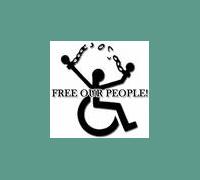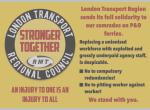Disability Confident Scheme
Conference acknowledges the principles of the UK Government’s Disability Confident Employer Scheme, to support and recognise businesses that are actively inclusive in their recruitment and retention practices. The scheme encourages employers to think differently about disability and take action to improve how they recruit, retain and develop disabled people.
Network Rail, Train Operating Companies and many smaller organisations within the Transport sector have signed up to the scheme which offers free access to guidance, peer support groups and specialist events to build skills and confidence when employing and retaining disabled workers.
Organisations receive accreditation when they join the scheme, including a certificate and Disability Confident badge to use on their website and in their recruitment processes. It is widely acknowledged that having an effective framework in place to retain people with a disability or health condition is crucial – it saves money on recruitment and training, prevents businesses from losing valuable skills and talent and creates a diverse workforce which inevitably reflects a diverse customer base.
However, this union notes that a 2019 Freedom of Information request revealed that the 13,600 employers signed up to the government’s Disability Confident scheme since it launched in 2013 had pledged to provide just 8,763 paid jobs for disabled people between them - an average of less than two-thirds of a job per employer, despite these including many of the country’s largest employers.
Labour MP Marsha de Cordova, former shadow minister for disabled people, described the scheme as a ‘failure’ and pointed out that employers can obtain Disability Confident status without employing a single disabled person, adding that, “The Disability Confident scheme lacks any accountability, transparency or credible performance measures to ensure that employers recruit disabled people.”
By the DWP’s own admission, Disability Confident is “business-led”. It is not led by the needs and demands of disabled people.
Moreover, our own experience is that disabled workers are frequently discriminated against, excluded and treated badly by ‘Disability Confident’ employers. A Health and Wellbeing at Work survey carried out by the Chartered Institute of Personnel and Development (CIPD) found that the knowledge and confidence of line managers to manage people with a disability or long-term health condition is the most common challenge experienced by organisations.
Members who become disabled or for whom an existing condition worsens, frequently find that their line manager is poorly equipped to manage the circumstances, often attempting to deal with the worker in terms of performance, attendance or the economic implications for the business.
Members are often forced to take long term sick leave which has a very real impact on their financial stability, mental health and wellbeing, rather than being allowed to explore options for temporary or permanent adjustments which may include shorter working days, redesigning a job-role or transferring to a different job role.
Conference recommends that the General Secretary write to Network Rail and all Train Operating Companies, encouraging employers to manage employees with disabilities sensitively and in a way which has the least impact on personal finances, mental health and wellbeing and request information on how organisations manage the implementation of policies in relation to the scheme, including how they equip line managers with the skills and confidence to collaborate with disabled workers to find equitable temporary or permanent solutions.
Conference further recommends that the General Secretary commission an on-line survey of RMT members to establish if the policies adopted by Network Rail and Train Operating Companies meet the aspirations of the Disability Confident Employer Scheme in practice.
Where the experiences of disabled members who work for employers with Disability Confident accreditation reveal discrimination and/or unfair treatment, we ask the union to challenge those employers’ accreditation. Outcomes of these activities should be reported back to this Advisory Conference in due course.
Beyond Awareness
This union notes that:
1. employers, charities and others regularly run ‘awareness’ campaigns around disability
2. disabled people are increasingly challenging this approach
3. autistic activists have successfully lobbied the National Autistic Society to declare April as Autism Acceptance (previously ‘Awareness’) Month
4. many employers run ‘mental health awareness’ campaigns while continuing to expose workers to bullying, anti-social hours, insecure employment, low pay, excessive workload and other factors that cause mental distress.
This union believes that:
1. while increasing public knowledge is important, disabled workers need action not just awareness
2. some employers run ‘awareness’ campaigns as cover for maintaining disabling working conditions
3. our aim is to radically improve disabled workers’ conditions not simply raise awareness of our physical, mental or sensory conditions.
This union resolves to:
1. campaign for the changes set out in our Disabled Workers’ Charter
2. challenge employers which run ‘awareness’ campaigns to make specific changes to working conditions that remove disabling barriers and benefit disabled workers
3. support and assist branches in running campaigns that go beyond simply awareness-raising.
Training Courses
This Branch notes that:
1. RMT is now requiring eight reps to be enrolled on a training course before it can go ahead, regardless of how many members who are not reps enrol on it.
2. this is a change from previous policy, where courses needed eight members enrolled in order to go ahead
3. the policy change has been made without consultation with (or even notification of) our lay tutors or NEC.
4. this policy has resulted in disabled members courses being cancelled.
This branch believes that:
1. activists who are not reps are important to building our union’s strength
2. therefore, the union benefits from providing training for them
3. cancelling training courses wastes resources and is not justifiable when eight or more members wish to attend them
4. many members gain the confidence and knowledge they need in order to become reps from attending training courses
5. this is particularly the case with members of demographic groups which are already marginalised within the union, for example our equality groups; this new policy further marginalises them
6. the union may need to address the backlog of reps' training due to the pandemic, but this policy does nothing to achieve that
This branch resolves to:
1. rescind this decision and return to the previous policy of requiring eight members to enrol on a course for it to go ahead
2. not make decisions like this without prior consultation with tutors and the Education Advisory Committee and the endorsement of the NEC.
GWR and Neurodivergent Workers
GWR ignore advice on Neurodivergent issues. Showing Management’s lack a knowledge, effective training and understanding of Neurodivergent colleagues and issues.
A little bit of knowledge can do more harm to Neurodivergent members.
Bristol Branch demands that GWR
• Trains all its managers effectively on autism, neurodiversity and mental health
• Releases its union reps to attend union-organised training on autism, neurodiversity and mental health
• Establishes a working group on autism and neurodiversity, led by neurodivergent people and including union representatives, to develop policy and identify workplace changes that would better accommodate neurodivergent workers, considering issues such as the sensory environment, working hours and management styles
• Ensures that its Occupational Health service has sufficient up to date expertise in autism and neurodivergence
• Reviews its policies on sickness absence and support for carers with a view to improving the level of support they provide.
Neurodiversity Level Two Course
We the members of Plymouth No.1 Branch call upon the National Executive Committee this union to introduce a Neurodiversity Level Two Course to be run at the Bob Crow Centre or where possible, regionally.
This course would not only benefit members with this impediment but would also benefit the union in general going forward. Being a member with a neurological condition I feel that our union do not understand the issues surrounding neurological conditions. If there was more information about this we could help members who have the conditions.
- 2843 reads






